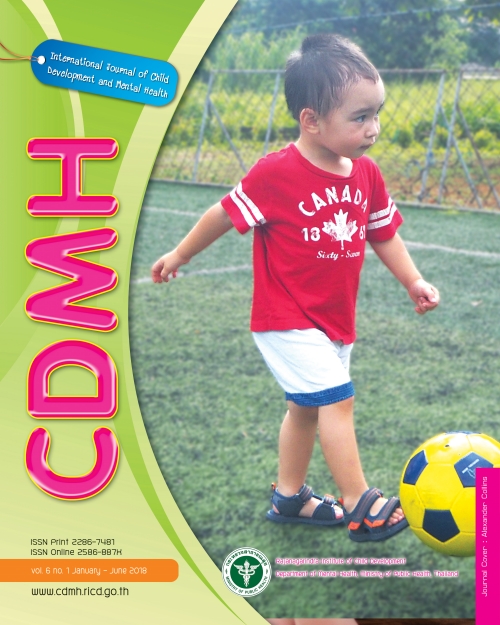Multimodal Social Skills, Communication and Behavioral Intervention for Children with Autism Spectrum Disorder: Comparison of Multiple Indices for Treatment Effectiveness
Main Article Content
Abstract
The study aimed to investigate the treatment effectiveness of evidence-based intervention program called Multimodal Social Skills, Communication and Behavioral (MSSCB) program. 34 participants with the diagnosis of high-functioning Autism Spectrum Disorder (ASD) aged between 3 to 12 year-old were recruited (F=9, M=25;Mean age =8.03, SD=2.14) at the beginning. The study collected and analyzed the data of participants’ socio-demographic characteristics as well as their psychometric outcomes measuring their cognitive, social, communication, behavioral, emotional, and other adaptive function. We used t-test and SPSS to analyze the data that were obtained at the beginning and at the time six months later on. The mean of the scores from the social domain of parents’ ASD screening questionnaires declined significantly (t=-2.15, p<0.05, α = .05). The means of the standardized scores in overall performance, communication domain, and social domains of Vinland’s Adaptive Rating Scale (Interview Version) elevated significantly (t=3.40, 3.69, & 2.35 respectively, P<0.01, α = .05). Additional significant improvements were noticed in the scores of syndrome scales of withdrawn/depressed, social problems, and aggressive behavior reported by parents and the scores of the externalized problem scale and syndrome scale of rule-breaking behavior reported by teachers (p-value ranged from 0.004 to 0.050, α = .05). The present study implies that MSSCB program might be effective for children with high-functioning ASD detected by several psychometric measurements. Nevertheless, not all indices consistently and significantly supported benefits of the program. Further discussion and suggestions were made for the establishment and examination of an evidence-based intervention program for children with ASD
Article Details
![]()
Creative Commons License
This work is licensed under a Creative Commons Attribution-NonCommercial-No Derivatives 4.0 International (CC BY-NC-ND 4.0)
The authors retain copyright and permit the journal the copyright of first publication
Articles, once having passed the review process and accepted for publication in the CDMH Journal, are copyrighted under the CDMH Journal, Department of Mental Health, Ministry of Public Health. Please be aware distribution of CDMH Journal content for commercial purposes without permission is expressly prohibited. However, distribution with intent to educate, advocate, or spread awareness within the general public and research communities is permitted and encouraged with the understanding that the CDMH Journal Editorial Board do not hold jurisdiction or liability for any accompanying comments, text, or information from third parties, either in favor for or against the original article’s assertions, conclusions, methodology, or content.


